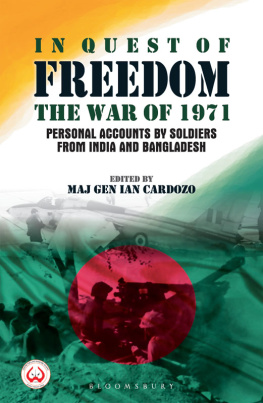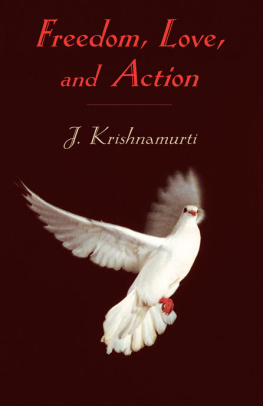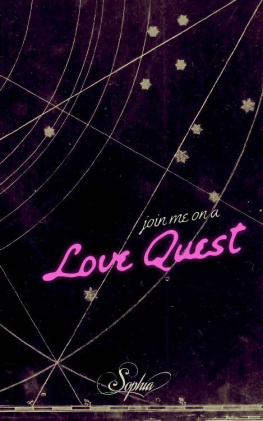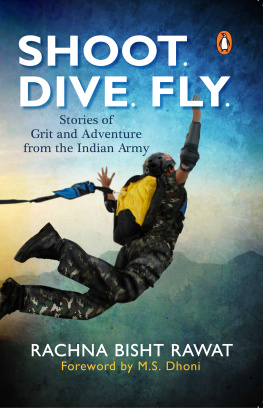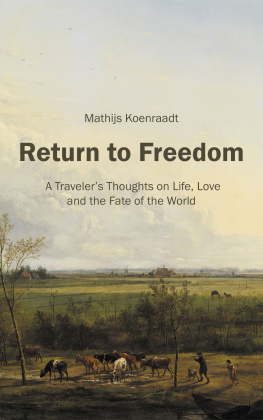Contents
Guide

IN QUEST OF FREEDOM
THE WAR OF 1971
IN QUEST OF FREEDOM
THE WAR OF 1971
PERSONAL ACCOUNTS BY SOLDIERS
FROM INDIA AND BANGLADESH
Edited by
Maj Gen Ian Cardozo



Copyright 2016, Centre for Land Warfare Studies
First Published, 2016
All rights reserved. No part of this publication may be reproduced or transmitted in any form or by any means, electronic or mechanical, including photocopying, recording, or any information storage or retrieval system, without prior permission in writing from the copyright holder.
No responsibility for loss caused to any individual or organization acting on or refraining from action as a result of the material in this publication can be accepted by Bloomsbury India or the author/editor.
BLOOMSBURY PUBLISHING INDIA PVT. LTD.
New Delhi London Oxford New York Sydney
E-ISBN 978-93-86141-66-8
10 9 8 7 6 5 4 3 2 1
Published by Bloomsbury Publishing India Pvt. Ltd.
DDA Complex LSC, Building No. 4, 2nd Floor
Pocket 6 & 7, Sector C
Vasant Kunj, New Delhi 110070
The Centre for Land Warfare Studies (CLAWS), New Delhi, is an autonomous think tank dealing with contemporary issues of national security and conceptual aspects of land warfare, including conventional and sub-conventional conflicts and terrorism. CLAWS conducts research that is futuristic in outlook and policyoriented in approach.
Centre for Land Warfare Studies
RPSO Complex, Parade Road, Delhi Cantt, New Delhi 110010
Tel: +91.11.25691308 Fax: +91.11.25692347
Email:
The publisher believes that the contents of this book do not violate any existing copyright/intellectual property of others in any manner whatsoever. However, in case any source has not been duly attributed, the publisher may be notified in writing for necessary action.
Dedicated to the Officers and Men of the Indian Armed Forces, and the Mukti Bahini, who fought for the liberation of Bangladesh
CONTENTS
In Quest of Freedom is a testament to the spirit of collaboration and aid between the Indian Armed Forces and the people of Bangladesh, who rose and triumphed against one of the most vicious campaigns against humanity in the twentieth century, a Pakistani jihad that resulted in its own defeat, the loss of ninety-three thousand prisoners of war and the liberation of a new country Bangladesh.
Whereas military historians have written about the war and what happened during those calamitous days in historical terms, it is the human aspect that is often lost in the recording of history. It is therefore the intention of this book to portray how individuals, both military and civil, saw the war and reacted to the callous challenges of a barbaric intervention and carried out their duties as best as they could. Their stories bring to light little known facts about what really occured during this brutal war.
So, while the military histories of the Indo-Pak War of 1971 cover the strategy, the challenges, and complexities of the campaigns and the brilliance or the blunders in the conduct of the battles; this book covers the experiences of the men who took part in them. Events that would be dismissed in official histories in a few lines are recounted here in greater detail.
The first part of this volume covers the carnage and savagery inflicted by the Pakistan Army on the helpless men, women, and children of Bangladesh. The misconduct of the Pakistani Army generals that allowed its officers and men to rape, pillage, and kill is perhaps one of the principal reasons for the Pakistan Armys abject defeat. Personnel of the Pakistan Army could no longer consider themselves to be soldiers. They had in fact become bandits and could not thereafter fight as a disciplined force. The extent of their depravity has never been exposed because it is too horrible to even comprehend. The misconduct of Pakistani officers and soldiers has been condemned in The Hamdoorman Report, Pakistans official document on the conduct of the Pakistan Army and the bearing of its officers and soldiers.
The second half deals with the war on the Eastern Front, which in fact was the focal point of this war. Whereas the capture of Dacca was not part of the original plan, so swift was the success of the Indian offensives that Dacca automatically fell into becoming the prime objective halfway through the war.
The third part of the book covers the war on the Western Front. The strategy here was one of offensive defence that is to defend in the West, but to carry out limited offensives to improve the ground position wherever possible, and to be in a position of advantage at the end of the war. However, so swift and successful was the war in the East that the conflict on that front was wrapped up in a mere thirteen days. America, was especially concerned that India would now shift her forces from the East to the West, in an attempt to once and for all resolve problems that had begun with partition and had continued ever since. Strategically, this is exactly what should have happened. The principles of war Concentration of Force, Offensive Action, Maintenance of Momentum, Flexibility, all demanded that we should have gone for the Pakistani jugular. But Indias political strategy did not envision the destruction of Pakistan and political considerations overruled a possible military option.
During the 1971 conflict, the Indian Air Force knocked the Pakistani Air Force out of the skies over East Pakistan and established air superiority for the entire duration of the war, allowing Indian land and naval forces to carry out their tasks without hindrance. This was a major factor in the success of the Indian operations over land and sea. The personal stories of some of those who took part in the air war makes for interesting reading.
The Indian Navy, which was hamstrung during the 1965 war by a government directive that prevented the force from undertaking offensive operations or crossing the 24th parallel, took the war into Pakistani waters during the 1971 hostilities, a day after Pakistan attacked Indian airfields. On the very first day of the war, Indian Navy missile boats sank a Pakistani destroyer, a minesweeper, and two merchant ships carrying ammunition. They then went on to set the Keamari oil fields, at Karachi on fire and it burned for seven days and nights. The Pakistani Navy bolted into Karachi harbour and refused to fight. As a result, for the first time in maritime history, a blockade of Pakistani ports on the West Coast was established without the physical presence of Indian Naval ships outside Karachi harbour! Again, on the very first day of the war, Pakistans long-range submarine PNS Ghazi that was tracking INS Vikrant, self-destructed, outside the port of Vishakhapatnam. On the East Coast, Indian Navy frogmen worked wonders, along with their Mukti Bahini counterparts, in destroying Pakistani naval and maritime craft in the river estuaries and approaches to Chittagong harbour. Finally, when an American task force of the Seventh Fleet moved into the Bay of Bengal from the Pacific, on orders of the American President Richard Nixon, to rescue Pakistan, it was too late! The war had been wrapped up and a new nation Bangladesh had been born.

